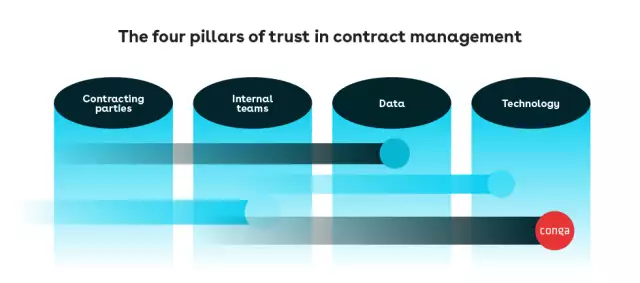
The contract management strategy you might be overlooking

When it comes to developing a contract management strategy, it's easy to get caught up in the nitty-gritty details of clauses, terms, and conditions (oh my!). But there's one crucial component that often gets overlooked: trust.
Think of trust as the glue that holds every contract together. Without it, even the most meticulously crafted agreements can fall apart. In this article, I’ll explain how to infuse trust into every aspect of your contract management strategy and provide useful tips to build and maintain it from various angles.

Trust between contracting parties
Contracts are, at their core, relationship documents. Whether you are partnering with a vendor, customer, or third-party service provider, the agreement is only as strong as the belief that both sides will honor it.
Establishing trust is crucial for several reasons:
- Transparency breeds trust. Ambiguity in language, hidden clauses, or one-sided terms might be enforceable, but they do not build goodwill. Clear and open communication is essential for fostering trust.
- Trust accelerates business. When counterparties believe you are fair and reliable, negotiations move faster, renewals become simpler, and disputes decrease. This leads to more efficient and productive business relationships.
- Long-term relationships depend on trust. Contracts might close deals, but trust ensures those deals last. Building trust can lead to repeat business and long-term partnerships.
To ensure trust between contracting parties, consider these actionable tips:
- Use plain language. Avoid jargon and complex legal terms that can create confusion.
- Clarify obligations and expectations. Make sure both parties understand their responsibilities and what is expected of them.
- Leave room for fair negotiation. Ensure that the contract terms are balanced and allow for adjustments if necessary.
- Focus on contract creation. Ensure that the initial drafting of the contract is clear, fair, and transparent to build a strong foundation of trust from the beginning.
Trust within internal teams
Contract management is not just legal’s responsibility. Sales, procurement, finance, and operations all have a stake in the lifecycle of a contract.
For effective cross-functional alignment, confidence is essential:
- Sales needs to trust that legal will not slow down the deal.
- Legal needs to trust that sales will not go rogue with redlines.
- Procurement must trust that negotiated savings will be honored in execution.
- Finance has to trust that the deal makes financial sense for the business.
Visibility is key. When teams do not have access to the same version of a contract or the same data about obligations and renewals, trust gives way to second-guessing and bottlenecks. Governance builds confidence. Standardized playbooks, approval workflows, and defined roles reduce chaos and friction.
To foster trust within internal teams, I recommend you do the following:
- Establish shared processes.
- Implement transparent workflows.
- Provide role-based access so everyone knows who is doing what and when.
- Utilize standardized playbooks and approval workflows to ensure consistency and reduce friction.
Trust in the data
Contracts hold some of the most critical data in the enterprise, including pricing, obligations, commitments, and risks. But too often, organizations do not trust their contract data.
This lack of trust can stem from several issues:
- Where is the truth? If five departments are tracking the same contract in five different systems, how do you know which data to trust?
- AI and analytics need clean inputs. You cannot gain insights from contracts if key terms and metadata are inaccurate, outdated, or missing altogether.
- Regulatory exposure increases. If you are unsure which contracts have clauses tied to new laws or regulations, the risk is not just operational; it is legal.
To build trust in contract data, organizations should:
Invest in AI-powered CLM software that can extract, structure, and validate contract data at scale. This is crucial as 79% of consumers say protecting their data is very important to earning their trust (PwC Trust in US Business Survey).
Centralize contract data. Use a single system to store and manage all contract information, ensuring consistency and reducing the risk of discrepancies.
Conduct regular audits. Periodic reviews of contract data help identify and correct inaccuracies, ensuring that the information remains up-to-date and reliable.
Trust in the technology
Modern contract lifecycle management (CLM) systems promise automation, intelligence, and control. But adoption only happens when users trust the system.
Several factors contribute to building this trust:
- Configurability Without Complexity: If the system is too complex, people work around it. A user-friendly system encourages adoption and trust.
- Explainable and Traceable AI: If the system is a black box, no one believes the output. AI-powered contract insights must be explainable and traceable to earn stakeholder trust. Transparency in technology builds confidence.
- Security Is Essential: If the system is not secure, trust collapses instantly. Data privacy, permissions, and audit trails are not nice-to-haves. They are foundations of trust. Ensuring robust security measures is critical for maintaining trust in the technology.
To ensure users trust the system, consider these tips:
- Choose a CLM platform that balances ease of use with enterprise-grade controls, and make sure users understand how the system supports their goals, not just legal’s.
- Provide comprehensive training. Ensure users are well-trained on the system's functionalities and understand how it benefits their roles.
- Regularly update and maintain the system. Keep the contract management software up-to-date with the latest features and security measures to maintain user confidence.
Final thought: trust is a lifecycle too
Just like contracts, trust must be created, managed, and renewed. When parties trust each other, deals move faster. When teams trust each other, operations run smoother. When the business trusts the data, decisions get better. And when everyone trusts the system, adoption thrives.
Effective contract management is not just about compliance. It is about confidence. Build that confidence at every level, and contracts will not just protect your business…they will power it.
To explore how the right technology can help you build trust at every stage of the contract lifecycle—from collaboration to compliance—check out this AI-powered contract management guide.



